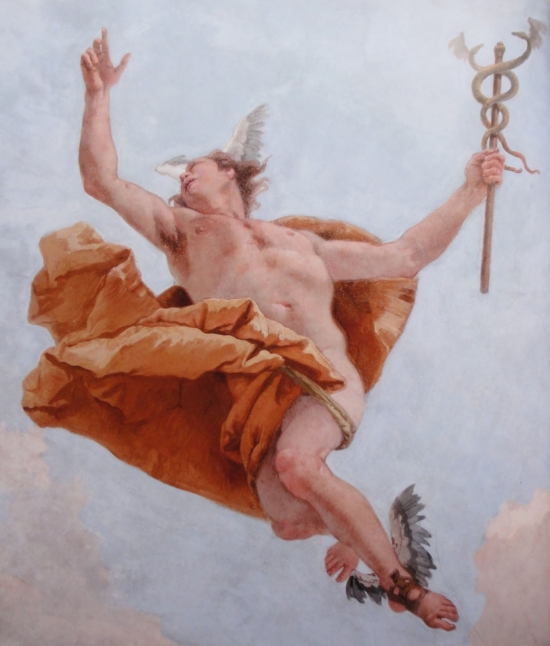 Studio Tablinum: this is an article that will certainly appeal to a male audience, while to the fairer sex do not will go unnoticed some similarities.
Studio Tablinum: this is an article that will certainly appeal to a male audience, while to the fairer sex do not will go unnoticed some similarities.
We will discuss about the most provocative and sensual deity in the pantheon: Aphrodite.
Born from the foam of the sea when Cronus, the titan lord of heaven in the second divine generation, emasculated his father Uranus. Just a few drops generated the Goddess of Love, Aphrodite celebrated as the Goddess of Beauty, Sensuality and Lust.
To Aphrodite are assigned many places of worship throughout Greece and are given to her various epithets, two best known are: Acidalia, due to the source in which she used to dive, located in Boeotia and Cytherea, derived from the place of his landing, soon after her conception, on the island of Kythera.
To the Goddess of Love is dedicated the celebration of the aphrodisiac *: a party in which dances become a kind of embrace of group. A party in which dancing and dances result in a kind of embrace of the group. In Corinth also participate the priestess of the goddess as an act of worship towards him.
 The Italian artist Sandro Botticelli in his famous painting “The Birth of Venus” makes full use of the mythical atmosphere of that event: Aphrodite is received on the beach by one of the Hours, deities of the seasons, especially the to the Spring proffers to her a blanket with embroidered flowers. Behind Aphrodite, Zephyrus heats her with his breath.
The Italian artist Sandro Botticelli in his famous painting “The Birth of Venus” makes full use of the mythical atmosphere of that event: Aphrodite is received on the beach by one of the Hours, deities of the seasons, especially the to the Spring proffers to her a blanket with embroidered flowers. Behind Aphrodite, Zephyrus heats her with his breath.
Let’s find out more about who was Aphrodite : Goddess of love is one of the few deities of the pantheon married but not for love: her marriage with the god of fire, Hephaestus, was the result of a deception.
There are many versions, I will follow the most reliable, but taking a step back: the Mother of the Gods, Hera, hurled her new born child Hephaestus, because of his ugliness, down from Olympus and remained crippled due to the impact to a leg.
 Determined to get back to Hera, being also the God of Metallurgy, imprison his mother on a throne especially created, in exchange for her release Hera granted to Hephaestus the permission to marry Aphrodite.
Determined to get back to Hera, being also the God of Metallurgy, imprison his mother on a throne especially created, in exchange for her release Hera granted to Hephaestus the permission to marry Aphrodite.
The marriage with Aphrodite made him the most mocked husband of the whole Pantheon.
Being an unhappy wife Aphrodite abandons the arms of divine lovers as Ares, god of war, and the mortal Anchises and Adonis.
One of the most exhilarating adventures about betrayals of Aphrodite with Ares was when , Hephaestus caught, cleverly, the two lovers in fragrant.
 Tired of the constant betrayals of the divine wife, conceived, over their wedding bed a system of chains so fine to result invisible. Leaving with an excuse, He get away from home and waits for the right moment.
Tired of the constant betrayals of the divine wife, conceived, over their wedding bed a system of chains so fine to result invisible. Leaving with an excuse, He get away from home and waits for the right moment.
He does not have to wait long before that Ares can sneak into the house and lie with Aphrodite, but at that point, the system created by Hephaestus snaps and imprisons the lovers.
Cries of despair rise from that alcove while the Fire God leads them to Olympos. The Goddess of Love is shamed, exposed tomockery of other Olympian gods. Poseidon, God of the Sea, orderes Hephaestus to free the two lovers and guarantees that Ares would pay for this adultery.
 One of her saddest vicissitudes happened to Aphrodite, is her love for the young mortal Adonis.
One of her saddest vicissitudes happened to Aphrodite, is her love for the young mortal Adonis.
The history between Adonis and Aphrodite begins even before Adonis is born: his mother Mirra was driven by the Goddess of Love to lie with his father Teia, committing incest, once the father was aware of deception chase her daughter with intent vindictive; Aphrodite, to subtract Mirra to the violence his father turns her into a tree, the tree of Myrrh *.
After nine months, the trunk of this tree is torn and emerges Adonis.
Aphrodite falls in love immediately with this little child and took him under his custody. growing Adonis develops a sort of divine beauty that attracts the Goddess of Love and beyond. Even the Goddess Persephone remains attracted to such an extent that he decided to kidnap the young man, only the intervention of Zeus was able to make peace between the two Goddesses, in fierce contrast, decreeing that Adonis should live a third of the year in Hades, third in Kythera and a third where he likes best.
The period of the year when it was not under the tutelage of the two deities was fatal. While located in the woods, is hit by a wild boar that kills him. The boar was Ares, the God of War who, jealous of Adonis, wanted to underline his supremacy over Aphrodite.
 While we might call a great love the affair between Aphrodite and the Trojan hero Anchises, not only for the fleeting embraces but especially for their long-term consequence. The goddess, in the guise of a Phrygian Princess, seduced Anchises while he herding sheep.
While we might call a great love the affair between Aphrodite and the Trojan hero Anchises, not only for the fleeting embraces but especially for their long-term consequence. The goddess, in the guise of a Phrygian Princess, seduced Anchises while he herding sheep.
Aphrodite pregnant, decides to reveal her true divine nature and reveals a prophecy on the unborn child to the father Anchise. In fact, from their union was born Aeneas, founder of the Roman people.
Anchises boasting of this relathionship, drunken, enrages Zeus, who hits him with a thunderbolt making him lame. During the last years of his life Anchises will be forced to witness the downfall of his Ilium.
During the fire, which destroyed the city, flees to Italy carried on the shoulders of his son Aeneas. He died on the beaches Drépano, today Trapani, where today there is a stele where is remembered.
 In the competition between women Aphrodite from his best, as in the case of the famous “Judgment of Paris”.* The golden apple with the inscription “the most beautiful”, became an object of contention since the time of the wedding of Peleus and Thetis, when Eris, goddess of discord, created that magic apple. Weary about that competition Zeus instructs Hermes to find a judge for their “non-partisan” and found him in the Trojan prince Paris.
In the competition between women Aphrodite from his best, as in the case of the famous “Judgment of Paris”.* The golden apple with the inscription “the most beautiful”, became an object of contention since the time of the wedding of Peleus and Thetis, when Eris, goddess of discord, created that magic apple. Weary about that competition Zeus instructs Hermes to find a judge for their “non-partisan” and found him in the Trojan prince Paris.
The Goddesses, to win the favor of the prince, promised him several rewards: Hera would have made him immensely rich, immensely wise Athena and Aphrodite immensely attractive in the eyes of women, according to what you choose?
Of course, be immensely attractive. So he chooses Aphrodite, that promises the most beautiful woman in the world: Helen Queen of Sparta. *
 Because of jealousy she does not spare even the beautiful mortal Psyche.
Because of jealousy she does not spare even the beautiful mortal Psyche.
Aphrodite ordered to Eros, God of Love, to use his arrows to make Psyche fall in love with the ugliest man on earth, but it happened that Eros pricked with one of his arrows and fell in love madly Psyche. Psyche, however, betrayed the trust of the lover Eros, trying to see him under the light of a lantern, which is unheard of for a mortal, aware of this Eros run away.
She, by the will of Aphrodite, will have to endure the tests comparable to the labors of Heracles: to divide the seed into the temple of the goddess, obtain the golden wool shearing some sheep grazing, go to Persephone, to take some of her beauty to be put in a box for the Goddess of Love. All these trials were completed with great success.
Realizing the love of Psyche and loving her in turn, implores Zeus because Eros makes Psyche immortal.
Eros decided to marry Psyche. Since that marriage, Eros and Psyche are inseparable. From their marriage was born Edonè, the Goddess of Pleasure.
 Aphrodite was also a goddess of compassion, as it is told in the story of the sculptor Pygmalion *.
Aphrodite was also a goddess of compassion, as it is told in the story of the sculptor Pygmalion *.
Pygmalion, a sculptor of undoubted ability, has not yet found the love of a woman who could reciprocate his love.
Appeared to him in a dream, Aphrodite, gave the sculptor to discover the pleasures of love, when that dream Pygmalion was inspired and created an ivory sculpture that resembled the Goddess of Love and named her Galatea.
Falled in love with his sculpture, he decided to live forever with her, he prays Aphrodite to make the sculpture animated, Aphrodite, compassionately, gave birth to the valuable sculpture. The two lovers decided to get married.
As you read from the vicissitudes you have just read, Aphrodite has never enjoyed a good reputation, terrible and cunning, capricious and moody, but still adored and respected.
To the Greeks she was the goddess of fecundity, the most beautiful deities of the pantheon. The Greeks had a deep respect for the Goddess of Love, so much to sing lullabies and prayers to propitiate the love and fertility. In the next month we will discuss the story of Hephaestus, God of Fire, “the supreme architect of Olympus”, as well as the husband of Aphrodite, as mentioned in this article.
Alessandro Cerioli
NOTES:
* From the name of the goddess comes the word Aphrodisiac: that is, a substance which, presumably, increase the capacity amatory.
* From this story the Myrrh tree is called “precious” because of its content: the story is about the birth of the myth of Adonis, while in everyday life a fragrant resin.
* As a gesture of Eris was born on the way to say “apple of discord”.
* From this decision of Aphrodite originate the basis for the future abduction of the beautiful Helen and the consequent tragic Trojan War.
* Since this event is usually called Pygmalion one who acts as master to another person, and teach it the basics of living in society.











































 Decisamente meglio andò alla principessa
Decisamente meglio andò alla principessa 















